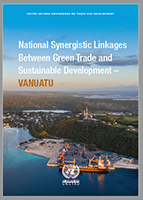
This report explores the potential for creating a matrix of national synergistic linkages between green trade and sustainable development in Vanuatu. As a Small Island Developing State (SIDS), Vanuatu faces unique challenges and opportunities in its pursuit of sustainable development. Smallness, remoteness, narrow export base, and exposure to global environmental challenges and external economic shocks come as “unique and particular vulnerabilities”.
Green trade is an integral element of overcoming some of the challenges and achieving sustainable development. Its importance lies in two areas. First, it opens doors to specialized markets that value “sustainability”, creating economic prospects. Second, it offers notable social and environmental benefits. In this context, Non-Tariff Measures (NTMs) and Voluntary Sustainability Standards (VSS) are important. They help in enhancing green trade and aligning it with Vanuatu’s national sustainable development strategies and the Sustainable Development Goals (SDGs) outlined in the 2030 Agenda for Sustainable Development.
The Vanuatu matrix of synergistic linkages presents how policy recommendations, aiming at fostering green trade, can contribute to achieving the country’s national sustainable development plan. The matrix is based on a foundation of data related to NTMs, as well as a comprehensive assessment of VSS for the Vanuatu virgin coconut oil sector developed as part of the Melanesian Spearhead Group (MSG) Green Trade Project funded by the United Nations.
NTMs and VSS are key instruments to shape the country’s green trade. NTMs, being mandatory trade requirements stipulated in regulations often for public objectives, form the essential framework which enables green trade. Meanwhile, VSS, which are voluntary private standards, or requirements, set out to meet specific economic, social and environmental metrics, create an extended sphere that increases the value of green trade. Ultimately, NTMs and VSS serve as tools for enhancing environmental protection, social inclusion, and economic prosperity.
The following section of this report will provide an overview of Vanuatu’s sustainable development strategies. Based on the confirmed linkage between Vanuatu’s strategies and the 2030 Agenda, the next section will examine the potential of Vanuatu’s NTMs and VSS for promoting green trade and achieving the SDGs, with a specific focus on virgin coconut oil as an example of the transformative potential of VSS.
Then, potential opportunities and challenges arising from green trade promotion will be assessed from the perspective of rural communities and of women and youth, to highlight the importance of “leaving no one behind”.
The conclusion offers the matrix of synergistic linkages between green trade policy recommendations and the achievement of the country’s sustainable development strategies.
This report also acknowledges the significance of regional integration in the Pacific region. The matrix has therefore been used to guide the creation of a sub-regional action plan for MSG countries.




